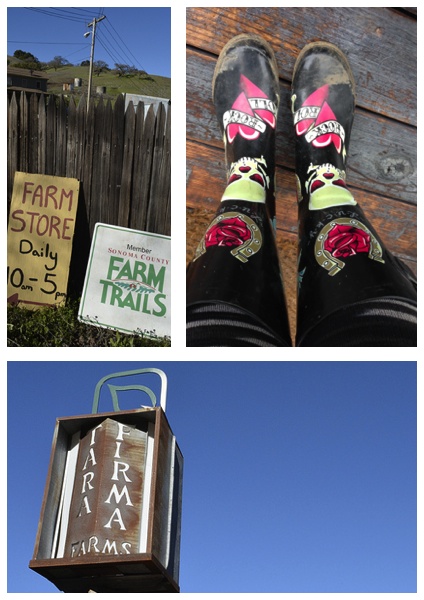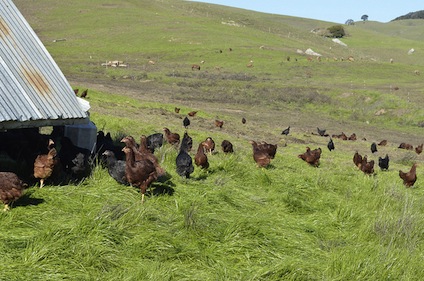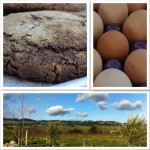On my Slow Food journey, my weekly CSA farm box has been my constant companion. Packed with seasonal veggies, fruit, and occasionally pastured meats or local cheese, the true gift of this box is that it has taught me to tune into what’s in season and tested my skills as a home cook. And did you know that our bodies need different types of nutrients at different times of the year? By eating what’s in season we are doing ourselves – and the environment – a great service.
So it’s with a great sense of anticipation that on a rare 70-degree day in December, I get ready to drive the poorly-paved county road to meet with Tara Smith, at her eponymously named Tara Firma Farms just outside of Petaluma. Tara and her husband, Craig, founded the farm just three years ago and are part of a new generation of farmers who personify Community Supported Agriculture or CSA.
I notice that I’m a tad outside of my comfort zone as I get ready for my meeting with Tara. After all, I’m a city girl at heart and much more accustomed to having meetings in Silicon Valley boardrooms with impassioned entrepreneurs seeking assistance in publicizing their latest whizz-bang invention. Today my role is different. I asked for this meeting not just to understand what goes on behind the scenes at a CSA farm, but because I am eager to gain insights from Tara who has already built quite a reputation for herself as a slow food advocate.
I go through the same rigmarole that I do in preparing for any meeting, i.e. asking myself: “What the hell am I going to wear?” except this time the answer is not “jeans and a jacket” or “a dress and knee-high boots”. Instead, I opt for a long-sleeved t-shirt, jeans and my rain boots, congratulating myself on being smart enough to predict mud and puddles at this particular meeting. Problem is, my rain boots weren’t really designed with a farm outing in mind. They’re adorned with hearts, birds, and even a skull and crossbones. I worry that Tara will think I’m a complete waste of her time, but as I have seconds to spare before leaving the house, I stick my feet into my boots, wondering how easy it will be to drive in them.

My tires crunch on the gravel as I park at the farm and go to find Tara. She’s not in the farm store so I head over the big Victorian farmhouse which today is being fitted with solar panels. She comes to the door, a tall, striking blonde with curly hair, and I am irrationally thrilled to see she is wearing black and white zebra print rain boots. We head over to a rustic table and chairs and sit in the blazing sunshine where Tara immediately sets me at ease as we start chatting.
I start by asking Tara how she came to be a farmer and whether she grew up around agriculture. Turns out neither her nor her husband had anything to do with farming in their childhood and on leaving college started corporate careers with big tech companies. I wonder whether they ate healthily in their formative years, but no, Wonderbread and Velveeta cheese featured heavily in their diets. “Craig’s mom had four boys and as they became teenagers she would buy loaves and loaves of Wonderbread and make cheese sandwiches which she’d freeze so she’d always have their school lunch ready to go!”
Tara left the world of tech and went on to work for a long term care insurance company for 18 years. She credits her time there with giving her the know-how and confidence to run a business, which no doubt sets her apart from many farmers. Along the way, the couple had four boys and one weekend, their high school-aged son came home with a book for his parents to read. Unbeknownst to them, this assignment was to change their lives. The book was Michael Pollan’s, Omnivore’s Dilemma.
After reading two chapters, Tara called her husband into the room to tell him what she was learning about the state of the food system. “I couldn’t believe what I was reading. It was such a shock to us. I wondered, How is this possible, how could it be this bad? In fact I thought that perhaps what Pollan wrote was a lie. But the more we looked into it, the more we found that you have to be educated to get good food. You can’t just turn up at a farmers’ market and assume that the food is local and good quality.”
That very weekend, Tara, who had always shopped at Safeway, went to the Civic Center Farmers Market in Marin for the first time. By now, I can tell that Tara is a woman of action, so it comes as no surprise when she tells me that within a few weeks of her first visit to the market she had asked one of the market vendors if she could assist for free. “I wanted to find out how it worked.”
In the meantime, Tara’s husband ordered and read about 100 books about our food system. She was busy with her job in health insurance and raising her sons, so he’d earmark pages for her to read. The duo quickly became fanatical about the subject of real food, putting a bug in anyone’s ear who’d listen and inadvertently offending friends who’d cook them meals and then have to listen to their evangelical rants. “We weren’t discussing the food they were serving us, but in fact we were.”
In the end their nine-year old son, Joe, said “Mom, you need to stop talking or do something, because no one invites us to dinner anymore!” This wake-up call prompted Tara to call her friends, and their momentary hesitation when asked whether her son’s observation was true, was all she needed to know. One friend told her: “You don’t give us another solution, you just complain about food,” and that was enough to propel the couple into action.
They quickly sold their ownership in a charter cruise business to raise some capital and started looking at farms. Their idea property would be close enough to urban areas so people could visit the farm to learn about the importance of eating real food. “We had three goals in starting the farm,” Tara tells me. “Educate the community; provide healthy food profitably, and after about five years, create an educational platform to run something akin to an internship program for adults who want to learn about farming.”
Tara and Craig first picked up Omnivore’s Dilemma in September 2008, they started looking at property to buy within eight weeks and ultimately closed on their farm, just outside of Petaluma in Sonoma County, CA., in April of 2009, after receiving a grant from OpenSpace. It dawns on me that I’m the kind of person who reads a book and is stirred to sign up for a farm box. Tara on the other hand, read a book and threw in her entire way of life to buy a farm.
On day one, Tara built a chicken coop based on what she had learned from reading Joel Salatin’s books about animal husbandry and farming, by day two she was taking care of two newborn calves and within a few weeks the couple had started giving farm tours. (Part two of this interview to follow).







Hurry up with Part 2!!!